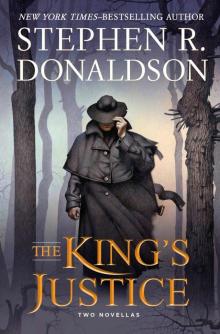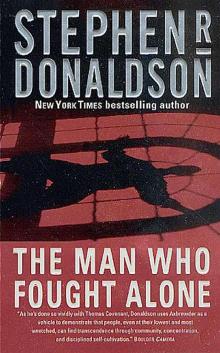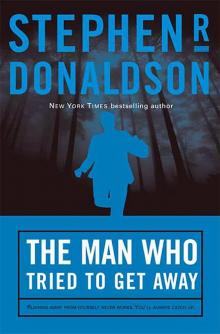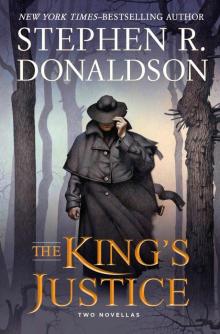- Home
- Stephen R. Donaldson
The Wounded Land t2cotc-1 Page 4
The Wounded Land t2cotc-1 Read online
Page 4
Intuitive revulsion appalled Linden. She could not think. She was not accustomed to such savagery. It violated all her conceptions of illness or harm, paralyzed her responses. This was not ordinary human ineffectuality or pain raised to the level of despair; this was pure ferocity, concentrated and murderous. She had to force herself forward. But when she drew near the woman and stretched out a tentative hand, Joan bit at her like a baited cat. Involuntarily, Linden recoiled.
“Dear God!” she panted. “What's wrong with her?”
Joan raised her head, let out a scream like the anguish of the damned.
Covenant could not speak. Grief contorted his features. He went to Joan's side. Fumbling over the knot, he untied her left wrist, released her arm. Instantly, she clawed at him, straining her whole body to reach him. He evaded her, caught her forearm.
Linden watched with a silent wail as he let Joan's nails rake the back of his right hand. Blood welled from the cuts.
Joan smeared her fingers in his blood. Then her hand jumped to her mouth, and she sucked it eagerly, greedily.
The taste of blood seemed to restore her self-awareness. Almost immediately, the madness faded from her face. Her eyes softened, turned to tears; her mouth trembled. “Oh, Tom,” she quavered weakly. “I'm so sorry. I can't-He's in my mind, and I can't get him out. He hates you. He makes-makes me- ” She was sobbing brokenly. Her lucidity was acutely cruel to her.
He sat on the bed beside her, put his arms around her. “I know.” His voice ached in the room. “I understand.”
“Tom,” she wept. “Tom. Help me.”
“I will.” His tone promised that he would face any ordeal, make any sacrifice, commit any violence. “As soon as he's ready. I'll get you free.”
Slowly, her frail limbs relaxed. Her sobs grew quieter. She was exhausted. When he stretched her out on the bed, she closed her eyes, went to sleep with her fingers in her mouth like a child.
He took a tissue from a box on a table near the bed, pressed it to the back of his hand. Then, tenderly, he pulled Joan's fingers from her mouth and retied her wrist. Only then did he look at Linden.
“It doesn't hurt,” he said. “The backs of my hands have been numb for years.” The torment was gone from his face; it held nothing now except the long weariness of a pain he could not heal.
Watching his blood soak into the tissue, she knew she should do something to treat that injury. But an essential part of her had failed, proved itself inadequate to Joan; she could not bear to touch him. She had no answer to what she had seen. For a moment, her eyes were helpless with tears. Only the old habit of severity kept her from weeping. Only her need kept her from fleeing into the night. It drove her to say grimly, “Now you're going to' tell me what's wrong with her.”
“Yes,” he murmured. “I suppose I am.”
Three: Plight
HE guided her back to the living room in silence. His hand on her arm was reluctant, as if he dreaded that mere human contact. When she sat on the sofa, he gestured toward his injury, and left her alone. She was glad to be alone. She was stunned by her failure; she needed time to regain possession of herself.
What had happened to her? She understood nothing about evil, did not even believe in it as an idea; but she had seen it in Joan's feral hunger. She was trained to perceive the world in terms of dysfunction and disease, medication and treatment, success or death. Words like good or evil meant nothing to her. But Joan-! Where did such malignant ferocity come from? And how-?
When Covenant returned, with his right hand wrapped in a white bandage, she stared at him, demanding explanations.
He stood before her, did not meet her gaze. The slouch of his posture gave him a look of abandonment; the skin at the corners of his eyes crumpled like dismay pinching his flesh. But his mouth had learned the habit of defiance; it was twisted with refusals. After a moment, he muttered, “So you see why I didn't want you to know about her,” and began to pace.
“Nobody knows”- The words came as if he were dredging them out of the privacy of his heart, — “except Berenford and Roman. The law doesn't exactly smile on people who keep other people prisoner-even in her condition. I don't have any legal rights at all as far as she's concerned. What I'm supposed to do is turn her over to the authorities. But I've been living without the benefit of law so long now I don't give a damn.”
“But what's wrong with her?” Linden could not keep her voice from twitching; she was too tightly clenched to sound steady.
He sighed. “She needs to hurt me. She's starving for it-that's what makes her so violent. It's the best way she can think of to punish herself.”
With a wrench, Linden's analytical instinct began to function again. Paranoiac, she winced to herself. He's paranoiac. But aloud she insisted, “But why? What's happened to her?”
He stopped, looked at her as if he were trying to gauge her capacity for the truth, then went back to his pacing.
“Of course,” he murmured, “that isn't how Berenford sees it. He thinks it's a psychiatric problem. The only reason he hasn't tried to get her away from me is because he understands why I want to take care of her. Or part of it. His wife is a paraplegic, and he would never consider dumping the problem off on anyone else. I haven't told him about her taste for blood.”
He was evading her question. She struggled for patience. “Isn't it a psychiatric problem? Hasn't Dr. Berenford been able to rule out physical causes? What else could it be?”
Covenant hesitated, then said distantly, “He doesn't know what's going on.”
“You keep saying that. It's too convenient.”
“No,” he retorted, “it's not convenient. It's the truth. You don't have the background to understand it.”
“How can you be so goddamn sure?” The clench of her self-command made her voice raw. “I've spent half my life coping with other people's pain.” She wanted to add, Can't you get it through your head that I'm a doctor? But her throat locked on those words. She had failed-
For an instant, his gaze winced as if he were distressed by the idea that she did in fact have the necessary background. But then he shook his head sharply. When he resumed, she could not tell what kind of answer he had decided to give her.
“I wouldn't know about it myself,” he said, "if her parents hadn't called me. About a month ago. They don't have much use for me, but they were frantic. They told me everything they knew.
"I suppose it's an old story. The only thing that makes it new is the way it hurts. Joan divorced me when we found out I had leprosy. Eleven years ago. Took Roger and went back to her family. She thought she was justified-ah, hell, for years I thought she was justified. Kids are more susceptible to leprosy than adults. So she divorced me. For Roger's sake.
“But it didn't work. Deep inside her, she believed she'd betrayed me. It's hard to forgive yourself for deserting someone you love-someone who needs you. It erodes your self-respect. Like leprosy. It gnaws away at you. Before long, you're a moral cripple. She stood it for a while. Then she started hunting for cures.”
His voice, and the information he was giving her, steadied Linden. As he paced, she became conscious of the way he carried himself, the care and specificity of all his movements. He navigated past the coffee table as if it were a danger to him. And repeatedly he scanned himself with his eyes, checking in turn each hand, each arm, his legs, his chest, as if he expected to find that he had injured himself without knowing it.
She had read about such things. His self-inspection was called VSE-visual surveillance of extremities. Like the care with which he moved, it was part of the discipline he needed to keep his illness arrested. Because of the damage leprosy had done to his nerves, the largest single threat to his health was the possibility that he might bump, burn, scrape, cut, or bruise himself without realizing it. Then infection would set in because the wound was not tended. So he moved with all the caution he could muster. The furniture in his house was arranged to minimize the risk of protruding corners, obs
tacles, accidents. And he scanned himself regularly, looking for signs of danger.
Watching him in this objective, professional way helped restore her sense of who she was. Slowly, she became better able to listen to his indirect explanation without impatience.
He had not paused; he was saying, "First she tried psychology. She wanted to believe it was all in her mind-and minds can be fixed, like broken arms. She started going through psychological fads the way some people trade in cars, a new one every year. As if her problem really was mental instead of spiritual.
"None of it made sense to her parents, but they tried to be tolerant, just did what they could to give Roger a stable home.
"So they thought she was finally going to be all right when she suddenly gave that up and went churchy. They believed all along that religion was the answer. Well, it's good enough for most people, but it didn't give her what she needed. It was too easy. Her disease was progressing all the time. A year ago, she became a fanatic. Took Roger and went to join a commune. One of those places where people learn the ecstasy of humiliation, and the leader preaches love and mass suicide.
“She must have been so desperate-For most of her life, the only thing she really wanted to believe was that she was perfectly all right. But after all those years of failure, she didn't have any defences left. What did she have to lose?”
Linden was not wholly convinced. She had no more use for God than for conceptions of good and evil. But Covenant's passion held her. His eyes were wet with violence and grief; his mouth was as sharp as a blade. He believed what he was saying.
Her expression must have betrayed some of her doubt; his voice took on an echo of Joan's ferocity. “You don't have to believe in God to grasp what she was going through. She was suffering from an affliction for which there's no mortal cure. She couldn't even arrest the way it rotted her. Maybe she didn't know what it was she was trying to cure. She was looking for magic, some power that could reach into her and heal-When you've tried all the salves in the world and they don't work, you start thinking about fire. Burn out the pain. She wanted to punish herself, find some kind of abnegation to match her personal rot.”
His voice broke; but he controlled it instantly. “I know all about it. But she didn't have any defences. She opened the door for him, and he saw she was the perfect tool, and he's been using her — using her, when she's too damaged to even understand what he's using her for.”
Using her? Linden did not comprehend. He?
Slowly, Covenant suppressed his anger. "Of course, her parents didn't know anything about that. How could they? All they knew was that about six weeks ago she woke them up in the middle of the night and started babbling. She was a prophet, she'd had a vision, the Lord had given her a mission. Woe and retribution to the wicked, death to the sick and the unbelieving. The only sense they could make out of it was that she wanted them to take care of Roger. Then she was gone. They haven't seen her since.
“After a couple weeks, they called me. I hadn't seen her-that was the first I'd heard about it. But about two weeks ago she showed up here. Sneaked into my room during the night and tried to tear my face off. If she hadn't been so weak, she would have succeeded. She must have come all the way on foot.”
He seemed too exhausted himself to go on pacing. His red-rimmed eyes made him look ill, and his hands trembled. How long had he been without decent sleep or peace? Two weeks? When he sat down on the opposite end of the sofa, Linden turned so that she could continue to study nun. In the back of her mind, she began trying to conceive some way to give him a sedative.
“Since then,” he sighed, “Berenford and I have been taking care of her. I got him into this because he's the only doctor I know. He thinks I'm wrong about her, but he's helping me. Or he was. Until he got you into this.” He was too tired to sound bitter. “I'm trying to reach her any way I can, and he's giving her drugs that are supposed to clear her mind. Or at least calm her so I can feed her. I leave the lights on in there all the time. Something happens to her when she's alone in the dark. She goes berserk-I'm afraid she'll break an arm or something.”
He fell silent. Apparently, he had reached the end of his story-or of his strength. Linden felt that his explanation was incomplete, but she held her questions in abeyance. He needed aid, a relief from strain. Carefully she said, “Maybe she really should be in a hospital. I'm sure Dr. Berenford's doing what he can. But there are all kinds of diagnostic procedures he can't use here. If she were in a hospital-”
“If she were in a hospital”- he swung toward her so roughly that she recoiled, — “they'd keep her in a straitjacket, and force-feed her three times a day, and turn her brain into jelly with electroshock, and fill her up with drugs until she couldn't recognize her own name if God Himself were calling for her, and it wouldn't do any good! Goddamn it, she was my wife!” He brandished his right fist. “I'm still wearing the bloody ring!”
“Is that what you think doctors do?” She was suddenly livid; her failure made her defensive. “Brutalize sick people?”
He strove to contain his ire. “Doctors try to cure problems whether they understand them or not. It doesn't always work. This isn't something a doctor can cure.”
“Is that a fact?” She did not want to taunt him; but her own compulsions drove her. “Tell me what good you're doing her.”
He flinched. Rage and pain struggled in him; but he fought them down. Then he said simply, “She came to me.”
“She didn't know what she was doing.”
“But I do,” His grimness defied her. “I understand it well enough. I'm the only one who can help her.”
Frustration boiled up in her. “Understand what?”
He jerked to his feet. He was a figure of passion, held erect and potent in spite of weakness by the intensity of his heart. His eyes were chisels; when he spoke, each word fell distinctly, like a chip of granite.
“She is possessed.”
Linden blinked at him. “Possessed?” He had staggered her. He did not seem to be talking a language she could comprehend. This was the twentieth century; medical science had not taken possession seriously for at least a hundred years. She was on her feet. “Are you out of your mind?”
She expected him to retreat. But he still had resources she had not plumbed. He held her glare, and his visage-charged and purified by some kind of sustaining conviction-made her acutely aware of her own moral poverty. When he looked away, he did not do so because he was abashed or beaten; he looked away in order to spare her the implications of his knowledge.
“You see?” he murmured. “It's a question of experience. You're just not equipped to understand.”
“By God!” she fumed defensively, “that's the most arrogant thing I've ever heard. You stand there spouting the most egregious nonsense, and when I question you, you just naturally assume there must be something wrong with me. Where do you get the gall to-?”
“Dr. Avery.” His voice was low, dangerous. “I didn't say there was anything wrong with you.”
She did not listen to him. “You're suffering from classic paranoia, Mr. Covenant.” She bit each word mordantly. “You think that everybody who doubts you isn't quite right in the head. You're a textbook case.”
Seething irrationally, she turned on her heel, stamped toward the door-fleeing from him, and fighting furiously to believe that she was not fleeing. But he came after her, caught hold of her shoulders. She whirled on him as if he had assaulted her.
He had not. His hands dropped to his sides, and twitched as if they ached to make gestures of supplication. His face was open and vulnerable; she saw intuitively that at that moment she could have asked him anything, and he would have done his best to answer. “Please,” he breathed. “You're in an impossible situation, and I haven't made it any easier. But please. At least consider the chance that I know what I'm doing.”
A retort coiled in her mouth, then frayed and fell apart. She was furious, not because she had any right to be, but because his attitud
e showed her how far she had fallen into the wrong. She swallowed to stifle a groan, almost reached out toward him to apologize. But he deserved something better than an apology. Carefully, she said, “I'll consider it.” She could not meet his eyes. “I won't do anything until I talk to you again.”
Then she left the house, frankly escaping from the exigency of his incomprehensible convictions. Her hands fumbled like traitors as she opened the door of her car, slid behind the wheel.
With failure in her mouth like the taste of sickness, she drove back to her apartment.
She needed to be comforted; but there was no comfort in those grubby walls, in the chipped and peeling floorboards which moaned like victims under her feet. She had accepted that apartment precisely because it offered her no comfort; but the woman who had made that decision was a woman who had never watched herself buckle under the demands of her profession. Now, for the first time since that moment of murder fifteen years ago, when her hands had accepted the burden of blood, she yearned for solace. She lived in a world where there was no solace.
Because she could think of no other recourse, she went to bed.
Tension and muggy sheets kept her awake for a long time; and when she finally slept, her dreams were sweat and fear in the hot night. The old man, Covenant, Joan-all babbled of He, trying to warn her. He who possessed Joan for purposes too cruel to be answered. He who intended to harm them all. But at last she sank into a deeper slumber, and the evil went back into hiding.
She was awakened by a knocking at her door.
Her head felt swollen with nightmares, and the knocking had a tentative sound, as if the knocker believed the apartment to be dangerous. But it was imperative. She was a doctor.
When she unclosed her eyes, the light of mid-morning pierced her brain.
Groaning, she climbed out of bed, shrugged her arms into a bathrobe, then went to open the door.

 The Illearth War
The Illearth War Last Chronicles of Thomas Covenant 02 - Fatal Revenant
Last Chronicles of Thomas Covenant 02 - Fatal Revenant Lord Foul's Bane
Lord Foul's Bane The Gap Into Ruin: This Day All Gods Die
The Gap Into Ruin: This Day All Gods Die White Gold Wielder
White Gold Wielder Fatal Revenant
Fatal Revenant The Mirror of Her Dreams
The Mirror of Her Dreams Against All Things Ending
Against All Things Ending The Real Story: The Gap Into Conflict
The Real Story: The Gap Into Conflict The Power That Preserves
The Power That Preserves Seventh Decimate
Seventh Decimate The Gap Into Power: A Dark and Hungry God Arises
The Gap Into Power: A Dark and Hungry God Arises A Man Rides Through
A Man Rides Through The Gap Into Vision: Forbidden Knowledge
The Gap Into Vision: Forbidden Knowledge The King's Justice: Two Novellas
The King's Justice: Two Novellas The Wounded Land
The Wounded Land The Runes of the Earth
The Runes of the Earth Mordant's Need
Mordant's Need The One Tree
The One Tree Gilden-Fire
Gilden-Fire Reave the Just and Other Tales
Reave the Just and Other Tales The Man Who Fought Alone
The Man Who Fought Alone The Last Dark
The Last Dark The Man Who Tried to Get Away
The Man Who Tried to Get Away Thomas Covenant 02: The Illearth War
Thomas Covenant 02: The Illearth War A Dark and Hungry God Arises
A Dark and Hungry God Arises The One Tree t2cotc-2
The One Tree t2cotc-2 Lord Foul's Bane cotc-1
Lord Foul's Bane cotc-1 The Illearth War t1cotc-2
The Illearth War t1cotc-2 The Runes of the Earth: The Last Chronicles of Thomas Covenant - Book One
The Runes of the Earth: The Last Chronicles of Thomas Covenant - Book One The King's Justice
The King's Justice White Gold Wielder t2cotc-3
White Gold Wielder t2cotc-3 The Power That Preserves t1cotc-3
The Power That Preserves t1cotc-3 Thomas Covenant 01: Lord Foul's Bane
Thomas Covenant 01: Lord Foul's Bane Chaos and Order: The Gap Into Madness
Chaos and Order: The Gap Into Madness Daughter of Regals
Daughter of Regals Forbidden Knowledge: The Gap Into Vision
Forbidden Knowledge: The Gap Into Vision Fatal Revenant t3cotc-2
Fatal Revenant t3cotc-2 The Runes of the Earth t3cotc-1
The Runes of the Earth t3cotc-1 Thomas Covenant 03: Power That Preserves
Thomas Covenant 03: Power That Preserves This Day all Gods Die: The Gap into Ruin
This Day all Gods Die: The Gap into Ruin The Wounded Land t2cotc-1
The Wounded Land t2cotc-1 This Day All Gods Die
This Day All Gods Die One Tree
One Tree